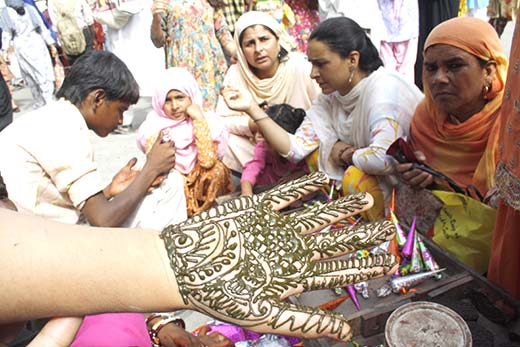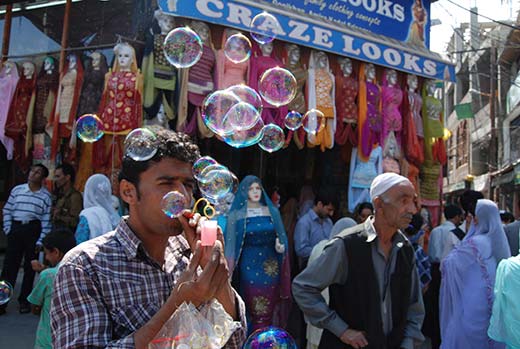In a disturbing trend, business establishments in Kashmir are fast being taken over by non-state subjects. Paying huge rents for tiny spaces and bearing losses all around, the question remains, what holds these people back? Syed Asma spends a day in one such market that is overwhelmed by these outsider businessmen

Pic: Bilal Bahadur
Located on the banks of river Jhelum, Gonikhan market is perpetually abuzz with life. One of the famous city markets primarily catering to the needs of womenfolk, Gonikhan is compressed in a narrow lane with its normal dimensions hardly visible to a passerby.
From the past many years, a disturbing trend can be seen overwhelming the market. The business establishments and shops in the market, earlier run by locals are fast taken over by non-locals and the visibility of the latter is getting more expressed every passing day.
“The trend started may be a decade ago, people from India mostly Muzaffarnagar, Surat, Banaras, and Bihar started coming to the market,” says a local shopkeeper in the market. “Soon they began running shops in partnership with the locals.
Unlike locals they cannot own the shops so they take it on rent on temporary basis, says Mir Muzamil, General Secretary of Gonikhan Traders Association.
The locals have noticed a certain pattern in their (outsiders) work. “First a single member of a family comes over to Kashmir and takes some space on rent. Steadily he calls his family members along with their extended relatives and gets them settled here. They may work here in Gonikhan or around but they surely increase their number in here,” the shopkeepers say.
Gonikhan has everything for womenfolk; costumes, cosmetics, sandals and what not. With the acumen of real salesman, an elderly man, in his sixties, invites each passer-by to see the hand-made sandals that he sells. A resident of Amritsar, Lala remains standing there from dusk to dawn generating a strong customer base.
It’s hardly a space of few feet that he occupies and not a single piece of sandal on the display seems attractive. But on noticing the interested individuals, Lala shows them the way upstairs.
“Beta do you want to see more, please go this way,” he keeps on saying to each interested passer-by. “We have a lot more inside.”
What lies inside is a narrow stair case that hardly is sufficient for a person to pass-by leading a whole different world. It includes a few sandal shops, a beauty salon, a costume shop, a jewellery shop and a cosmetic shop. Most of them are run by Lala and his family.
Living in Maisuma, Srinagar, for past decade along with his extended relatives Lala and his family understands Kashmiri as clearly as locals do. But they prefer to talk in Hindi, says Sunny, Lala’s son. Sunny runs one of the sandal shops in the building complex.
Sunny and his brother have spent most of their childhood in Kashmir, he says. After gauging the market potential of the place, Lala has called on his brothers to the Valley as well.
“Almost all their cousins have invested in one or the other business projects in Kashmir and are settled here as locals,” says one of the local shop owners wishing anonymity. “I heard one of his relatives has married a Kashmiri Pandit woman – a state subject. This link has helped them to own some property in South Kashmir as well.”
Lala is not the only outsider who runs a shop in the market. From road-side vendors to owners of substantial business establishments, the outsiders are seen everywhere in Gonikhun.
It is not only their huge number that is noticed in the area but their business tactics are also unique.
Surprisingly, these outsiders are paying huge amounts for meagre spaces. Apart from hiring shops, they are hiring stair cases, spaces under stair cases and corridors of a few feet. The local shopkeeper owners say, “though they [outsiders] have raised the rents of their properties but the source of their income seems dubious.”
Amazingly, a space of 5 by 7 feet in Gonikhun earns a rent of Rs 40,000 to Rs 1.5 lakh per month which is much more than the rents paid in any business hubs of Srinagar.
“A small shop or even a corridor will do for me,” says Jibran Qureshi, a resident of Muzaffarnagar. He has occupied a space on the road in front of a ready-made garment shop and pays Rs 15,000 per month to the shop owner. He is ready to pay even more, if the owner asks for hike.
Qureshi says back home, he has a family of six including his parents and three sisters. Looking at his humble family background and his stall of ordinary crockery, a rent of Rs 15,000 seems a tough job but he is reluctant to answer as to why he is ready to pay such a huge amount!
Adjacent to him is another youth Wasim Qureshi running a cloth shop. Qureshi is a resident of Banaras and runs a 5 feet by 9 feet shop. He pays the rent of Rs 40,000 each month. Wasim lives with his brother who runs another shop in the same market and pays Rs 50,000 for a bit bigger space.

Qureshi says they own a chain of cloth house in Banaras, Jammu and in Kashmir. “Among all those shops, the rent in Kashmir is the highest and the sales are not as good as in Jammu and Banaras.”
“We have to manage Srinagar’s rent from the business at other places,” Qureshi adds.
Bearing a loss every month, they are still running their business in Srinagar and what holds them back, Qureshi chooses not to answer this question.
A few steps away is one of the oldest ready-made garment shops of the market. He doesn’t look happy with this change and says we (the society) will have to bear the repercussions of their (outsiders) existence in next 20 years.
“They are coming in here, getting married to our daughters and becoming stake holders in our land,” he says, “and we are not even realizing what changes are they bringing with them.”
The ready-made garment shop is run by two brothers and they see a bigger conspiracy in the presence of outsiders.
“We have to look a bit wider and relate it to the issue of Gaza strip. It all starts and ends with occupation of different types and modes. May be 20 years later we would be in a position where Gaza is today,” says another brother who also wishes anonymity.
If rumours are to be believed many of these outsiders own a state subject certificate as well.
An elderly shopkeeper sharing his experiences said that decades ago a group of Sikhs had come somewhere from India and started taking shops on rent as these individuals are doing. After some years it was a Sikh from the same group who established the first licensed wine shop in Srinagar. “These are after-effects of settling outsiders in your land,” says an elderly customer who got interested in the discussion after one of the owners compared Kashmir with Gaza.
Among all these outsiders Lala earns the most but others are hardly managing any profit. But what holds them back in Kashmir is a question that none of them answered.















